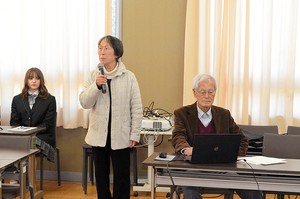Vox Populi, Vox Dei is a daily column that runs on Page 1 of The Asahi Shimbun.
March 14, 2023 at 12:55 JST
 Iwao Hakamada in Hamamatsu's Hamakita Ward, Shizuoka Prefecture, on March 13, when the Tokyo High Court granted him a retrial (Pool)
Iwao Hakamada in Hamamatsu's Hamakita Ward, Shizuoka Prefecture, on March 13, when the Tokyo High Court granted him a retrial (Pool)
Here is an excerpt from a letter from a man in detention: “Mother, there is a day-to-day calendar in my cell. It shows a picture of an old woman carrying a small child on her back and gazing at the sunset. It reminds me of you and my son."
It was penned by Iwao Hakamada, then 30 and on trial. He must have tried to shake himself out of his lethargy by thinking of his family.
The year before, a family of four had been murdered in Shizuoka Prefecture. Hakamada was later found guilty and sentenced to death. The verdict was finalized, despite vigorous protestations of his innocence in appeal courts.
After years of living every single day in terror of never knowing when his execution day would be, Hakamada developed mental problems. He would tell visitors, “Iwao Hakamada is gone. I, the omnipotent god, have absorbed him.”
At long last, the Tokyo High Court on March 13 ordered a retrial of the 1966 murder case, of which Hakamada, now 87, has consistently maintained his innocence.
After Hakamada spent most of his life fighting the false accusation, this must be the much-awaited victory and vindication to rejoice over.
But Hakamada remains silent. He is said to be “still in his own world.” What a cruel twist of fate.
French philosopher Michel de Montaigne (1533-1592) wrote in “The Essays” that punishing an innocent person is more criminal than the crime itself.
In its latest verdict, the Tokyo High Court pointed out that the blood-stained clothing, once considered the most compelling evidence of Hakamada’s guilt, could very well have been fabricated and planted by law enforcement officers.
If that was the case, “criminal” is too weak a word.
If judicial authorities have eyes, they must look at what they have done. They have irrevocably changed a man who once had the heart of a poet when he thought of his mother and his son at sunset.
From the day of his arrest until March 13, Hakamada walked through a long, dark tunnel--20,662 days in all, or as many pages of day-to-day calendars.
--The Asahi Shimbun, March 14
* * *
Vox Populi, Vox Dei is a popular daily column that takes up a wide range of topics, including culture, arts and social trends and developments. Written by veteran Asahi Shimbun writers, the column provides useful perspectives on and insights into contemporary Japan and its culture.




















A peek through the music industry’s curtain at the producers who harnessed social media to help their idols go global.
A series based on diplomatic documents declassified by Japan’s Foreign Ministry
Here is a collection of first-hand accounts by “hibakusha” atomic bomb survivors.
Cooking experts, chefs and others involved in the field of food introduce their special recipes intertwined with their paths in life.
A series about Japanese-Americans and their memories of World War II